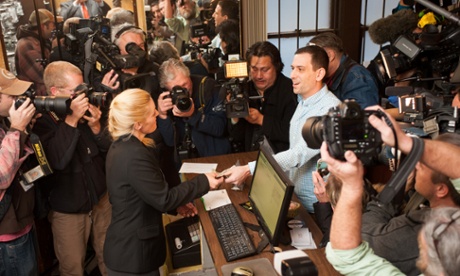Citizens may be able to see the world more clearly than narrowly focused professional economists

'Thatcher's big bang in 1986 laid the ground for freewheeling financial capitalism, whose destructive nature is at the heart of the current mess.' Photograph: PA Archive
You wouldn't have guessed it, given the fanfare surrounding the 0.8% growth figure for the first quarter of 2014, but people in the United Kingdom have been living through a period worse than Japan's infamous "lost decade" of the 1990s.
During that time, Japan's per capita GDP grew at 1% per year. This means that in 2000, Japan's per capita GDP was 10.5% higher than in 1990. In the UK, per capita GDP at the end of 2013 was 6.6% lower than that in 2007. This means that, unless the UK economy miraculously grows at around 5% a year for the next four years (factoring in population growth rate of around 0.7% a year), it is going to have a decade that is even more "lost" than Japan's 1990s.
The costs of the 2008 crisis in terms of human welfare have been even greater than the growth figures suggest. Unemployment is still nearly 7%, or at 2.24 million, depriving people of dignity and putting them under huge stress. Real wages have had some of the biggest falls in the OECD bloc of 34 countries and have a long way to go before they can recover to pre-crisis levels.
Steep cuts in welfare spending have hit many of the poorest hard. Increasing job insecurity, symbolised by the rise of zero-hours contracts, has been making workers' lives more stressful. The spread of food banks, the popularity of "poverty recipes" in cookery, and the advance of German discount supermarket chains, such as Aldi and Lidl, are the more visible manifestations of this pressure on the living standards of citizens.
What is more, even this sorry achievement has been made on the reversion to the economic model whose bankruptcy was laid bare by the 2008 crisis. That model was predicated on the deregulated financial system fuelling unsustainable growth by creating asset bubbles, one of the highest household debts in the world (as a proportion of GDP), and a large current account deficit.
How has this mess been created? The mismanagement of the crisis by the coalition government means it has to bear significant blame, but the main cause lies in the nature of the economic model that the UK has pursued for three decades.
This model started, as is well known, with Margaret Thatcher. She ripped up the post-second world war consensus on the mixed economy and started establishing one of the most deregulated economies in the rich world. Full employment was ditched as a goal and worker rights were weakened. State-owned enterprises were privatised, often with very negative consequences, as in the railways, water, and energy. Most importantly, her big bang financial deregulation laid the ground for the development of freewheeling financial capitalism, whose destructive nature is at the heart of the current mess.
Subsequent Labour governments took the roughest edges off Thatcherism by, for example, increasing social welfare spending and introducing the minimum wage. However, the underlying economic model remained intact; the New Labour thinking was that we should let the City maximise its profits by minimising regulation, and then help the poor with the taxes on those profits. There was no realisation that the financial system itself may be a problem.
After a brief period when it made noises about rebalancing the economy and the "big society", the coalition government has made a headlong dash for Thatcherism-plus. True, it has somewhat strengthened financial regulation, but in the meantime it has also subsidised the banks to the gills, both explicitly (bailouts) and implicitly (quantitative easing). Pursuing the doctrine of the balanced budget, it has cut spending in the middle of a recession, seriously delaying the recovery. It has made cuts to the welfare state that Thatcher herself would have found radical, while privatising "the Queen's head" (the Royal Mail), which even she refused to sell off.
Of course, all of these policies are supposed to have been backed up by scientifically proved economic theories – saying that markets are best left alone, that making the rich richer makes everyone richer, that welfare spending and protection of worker rights only make people lazy and dependent, and so on. Most people have accepted these theories without much questioning because they are based on "expert" advice.
However, all these economic theories are at least debatable and often highly questionable. Contrary to what professional economists will typically tell you, economics is not a science. All economic theories have underlying political and ethical assumptions, which make it impossible to prove them right or wrong in the way we can with theories in physics or chemistry. This is why there are a dozen or so schools in economics, with their respective strengths and weaknesses, with three varieties for free-market economics alone – classical, neoclassical, and the Austrian.
Given this, it is entirely possible for people who are not professional economists to have sound judgments on economic issues, based on some knowledge of key economic theories and appreciation of the political and ethical assumptions underlying various theories. Very often, the judgments by ordinary citizens may be better than those by professional economists, being more rooted in reality and less narrowly focused.
Indeed, willingness to challenge professional economists and other experts is a foundation stone of democracy. If all we have to do is to listen to the experts, what is the point of having democracy?
What this means is that, as citizens in a democracy, all of us have the duty to learn at least some economics and engage in economic debates. This is not as difficult as it may seem. As I try to show in my new book, Economics: The User's Guide, most of economics can be understood by anyone with a secondary education, if it is explained accessibly.
The economy is too important to be left to professional economists (and that includes me). As citizens, we should all learn economics and challenge what the professionals tell us to believe.




